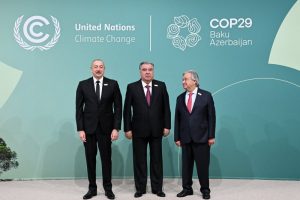 DUSHANBE, 12.11.2024 /NIAT “Khovar”/. On November 12, the 29th Conference of the Parties to the United Nations Framework Convention on Climate Change began its work in Baku.
DUSHANBE, 12.11.2024 /NIAT “Khovar”/. On November 12, the 29th Conference of the Parties to the United Nations Framework Convention on Climate Change began its work in Baku.
The President of the Republic of Tajikistan, heads of 80 countries, the Secretary General of the United Nations, heads of governments and delegations of dozens of influential international organizations took part in this conference.
President of the Republic of Azerbaijan Ilham Aliyev and Secretary General of the United Nations António Guterres received the Head of our state Honorable Emomali Rahmon and other participants at the venue of the conference.
The President of our country, as the leader of the pioneer state in the promotion of global water and climate issues, was one of the first to deliver speech at the opening of the summit of heads of state.
During the speech, the Head of our state, Emomali Rahmon, drew the attention of the participants of the high-level conference to the issues of climate threats and their consequences, and called on everyone to increase their efforts and actions to solve climate problems.
It was emphasized that the measures taken will undoubtedly help to strengthen the capacity of countries in adaptation and reduce vulnerability to climate change, including through financial assistance from developed countries.
In connection with the transition to «green energy», it was proposed to take urgent actions in this direction.
President Emomali Rahmon stated that the effective use of renewable energy sources will efficiently contribute to the reduction of greenhouse gas emissions and the development of the «green economy».
Honorable Head of State Emomali Rahmon deliberated on the adoption of the Strategy for the development of the «green economy» by Tajikistan and stated that “we intend to make energy production in the country entirely from renewable sources by 2032, and by 2037, we will transform Tajikistan into a «green» country”.
It was said that today 98 percent of our electricity is generated by hydropower, and the share of Tajikistan in the amount of greenhouse gas emissions is at a low level, and according to this indicator, our country is in 130th place in the world.
Honorable Head of State Emomali Rahmon, during his speech, also drew the attention of state leaders and experts to the topic of the close connection between water and climate, and suggested that special attention should be paid to the rapid melting of glaciers.
It was mentioned that Tajikistan, as a country vulnerable to this process and a member of the High-Level Panel on Water and Climate, took the initiative to announce the «Year of Glaciers’ Preservation», which was approved by the United Nations General Assembly with the support of the international community.
The Head of State pointed out with satisfaction that, in this context, the «World Day for Glaciers» was also proclaimed, and the Trust Fund to support glacier preservation efforts was established under the United Nations.
«We, as co-authors of this resolution, placed our share in this fund and we call on all our partners to follow this initiative,»- said President Emomali Rahmon.
It was emphasized that based on this resolution, the holding of a High-level International Conference is planned in Dushanbe in May 2025 in order to comprehensively review and help solve the problem of melting glaciers.
The Head of our state, Honorable Emomali Rahmon, as a sign of continuation of advancing the glacier protection agenda, also recalled about the support of the joint proposal of Tajikistan and France to declare the years 2025-2034 as the «Decade of Action for Cryospheric Sciences» and the adoption of a UNGA resolution in this regard.
Concluding his speech, the President of the Republic of Tajikistan, Honorable Emomali Rahmon, given the importance of the mentioned issues and with the aim of accurately studying the impact of climate change on the glaciers of the region, proposed that a Regional Coordination Center on Glaciology be established in the city of Dushanbe under the auspices of the World Meteorological Organization and in cooperation with other development partners.


